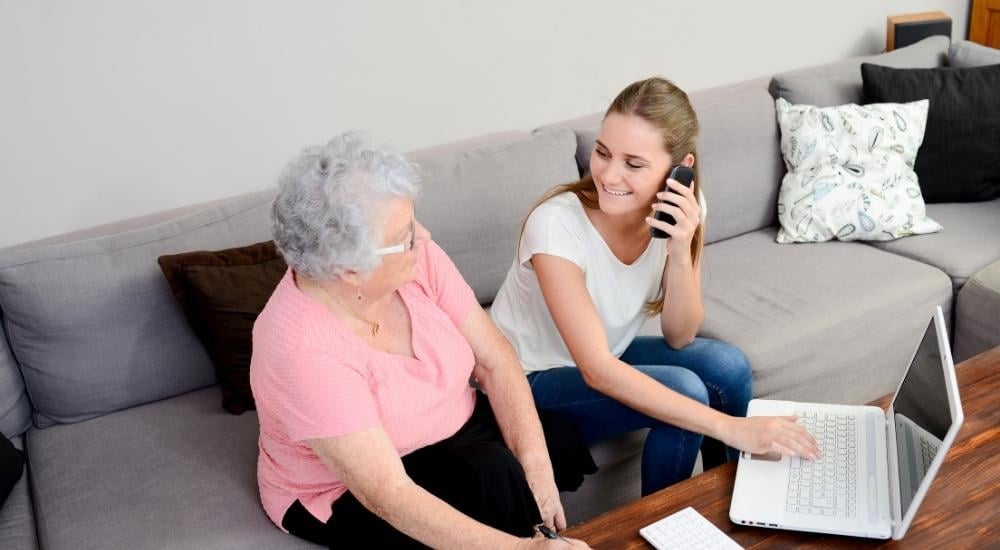Going on a holiday can be enjoyable for those who want a break from their everyday routine and enjoy new experiences. For people living with dementia, a holiday can be an exciting time, but also be daunting with the pressures of coping with a new place and routine. Whether it is solo travel or accompanying a friend or loved one with dementia, a well-prepared plan can help reduce the stress of traveling, as well as create the best possible experience for them and their travel companions.

Here are some tips to consider when planning for a holiday for someone living with dementia:
1. Get a Medical Letter or Doctor's OK before you Travel
Speak with a doctor to see if the planned holiday is suitable for the person with dementia. Any helpful suggestions can help take the stress out of holiday preparations, and may include a request for a medical clearance especially of they are planning on driving long distances, managing motion sickness, ensuring they have the correct medications and a clear schedule of when to take them, and a script for any additional medications that may be required during their stay.
Due to travel restrictions around Covid-19, a vaccination certificate or medical exemption may be required for certain destinations, so best to ensure you have an easily accessible copy should this be required anywhere you plan to visit.
2. The Length of your intended Stay
If you haven’t previously traveled with dementia, or as a companion, then starting with a shorter regional holiday might be more suitable before venturing on a longer trip (ie. interstate or overseas).
For some people with dementia, a long trip can be overwhelming and tiring after being in a new environment for too long. It is important to be realistic when assessing their abilities prior to travel. A day trip or a few nights away can be less stressful, and therefore more enjoyable for everyone.

3. The Season you travel in
Looking into the season of the trip is an important factor when holiday planning. People living with dementia may have different preferences for activities they enjoy, and the weather they feel most comfortable travelling in.
Another thing to consider is the person travelling with dementia’s ability to cope in busy holiday spots, and amongst potential holiday crowds. If they are easily overwhelmed, try to avoid traveling during peak travel seasons like school holidays if you can, especially if the crowds and distractions may trigger unpleasant or overwhelming feelings for them. For many tourism destinations, especially those popular with families or groups, it may be preferable to book in low, or shoulder seasons so that the accommodation, and the town and its surroundings, are less busy. Researching where you want to go for your trip prior to booking is a must.
4. Booking your trip
You will most likely want to book in a peaceful place where it is easy to decompress and relax. Unexpected situations can arise during your holiday, so try to book both your accommodation and any activities you want to experience ahead of time to ensure that your trip will run as smoothly as possible.
Search for accessible accommodation providers where staff have received training in how to best look after those with accessible travel needs. Should any additional services or equipment be required, find out where they are ahead of time, or speak to your accessible accommodation hosts before your stay and they should be able to assist you.

5. Selecting Transportation
Depending what works best for the person traveling with dementia and their travel capacity, the type of transport to and from your holiday will be an important factor to consider. It is best to book transport, such as flights, hire cars, train, boat, etc., that are direct, and during quieter times of the day to minimise sensory overload. Notify transport providers and organise any specific assistance that you may require prior to travel so that they can provide adequate support, as well as arrange seating that accommodates the person’s travel needs.
Traveling by private car might be the best option for those who experience sensory overload as it allows the flexibility to stop or take a break during long trips, and travel at times that suit you. Consider using the safety lock whilst in the car to prevent accidental openings, and ensure that it is safe getting out of the car when near traffic.
6. Do you need to get Travel Insurance?
Travel insurance, especially if venturing overseas, will be vital for peace of mind. Research the best insurance for your needs, and select the best policy for the person living with dementia that covers any medical emergencies, damages, or any other unexpected costs that may be incurred whilst away. Having travel insurance will provide a backup plan in case the plan needs to change unexpectedly.

7. Emergency Contact Details
Bring identification (e.g. bracelet, ID, or a piece of paper in pocket, wallet or bag) with the person’s details, and contact information for their accommodation as this will be helpful in the instance of them wandering off or getting lost while away. Carrying a list of any specialist doctors, medications, and their emergency contact details is also important to have in case of any emergency.
To find additional help for people with dementia in Australia, please contact:
The National Dementia Helpline
Phone: 1800 100 500
Email: helpline@demntia.org.au
Website: dementia.org.au
Dementia Behavior Management Advisory Service (DBMAS)
Service for Carers and Care Workers
Phone: 1800 699 799
Email: dsa@dementia.com.au
Website: dementia.com.au
Download the PDF Version of this blog
Read more on Accessible Travel at our Club Holiday Resorts
Sources
https://www.dementia.org.au/sites/default/files/resources/Travelling-with-dementia.pdf
https://www.finder.com.au/travel-insurance-for-alzheimers
https://www.betterhealth.vic.gov.au/health/conditionsandtreatments/dementia-driving-and-travelling
https://www.accessibleaccommodation.com/




